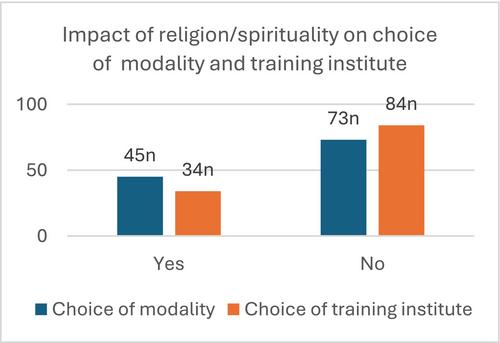Being Religious or Spiritual on Therapeutic Training Courses in the UK: A Nationwide Survey
Abstract
Background
There is limited research in the UK exploring how counsellors/psychotherapists who identify as religious/spiritual experience undergoing therapeutic training. Existing research is primarily based on small-scale qualitative studies.
Aims
This paper outlines findings from an online survey that collected data on how trainee and newly qualified counsellors/psychotherapists, who identified as religious/spiritual, experienced training as a therapist within the UK.
Method
The survey gathered information on 118 participants’ motivations for training as therapists; their experience of applying for training; any conflicts or synergies experienced between their religious/spiritual worldviews and therapeutic theory and practice; and their experiences of speaking with peers, tutors, supervisors and therapists about their religion/spirituality. Data was analysed using descriptive statistics and content thematic analysis.
Results
Most participants reported that their religion/spirituality impacted their choice to train as a counsellor/psychotherapist, and almost half their choice of modality. Participants spoke infrequently about their religion/spirituality during the application process and on their training course. If they spoke about their religion/spirituality this was mainly with peers and personal therapists rather than tutors and supervisors. Most participants did not experience conflict between their religious/spiritual beliefs and their training, but 25% did report some form of conflict, and 40% that their religion or spirituality had changed as a result of their training.
Conclusions
This survey utilised a non-randomised sample and the findings cannot be generalised to a larger trainee population. Most participants identified as White/White British and heterosexual and were, or had been, training on an integrative or person-centred training course.


 求助内容:
求助内容: 应助结果提醒方式:
应助结果提醒方式:


